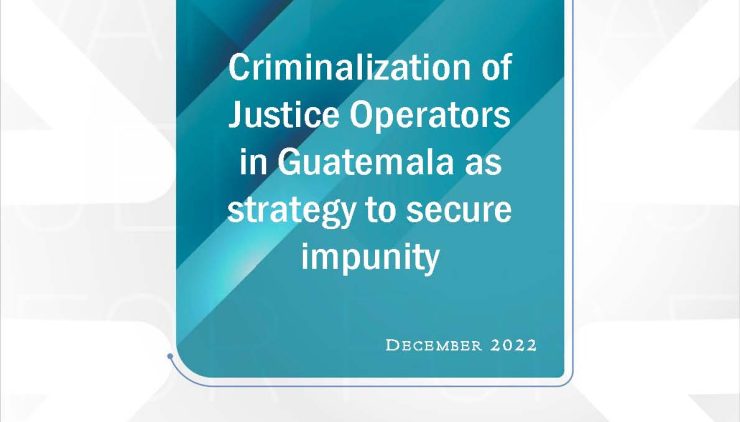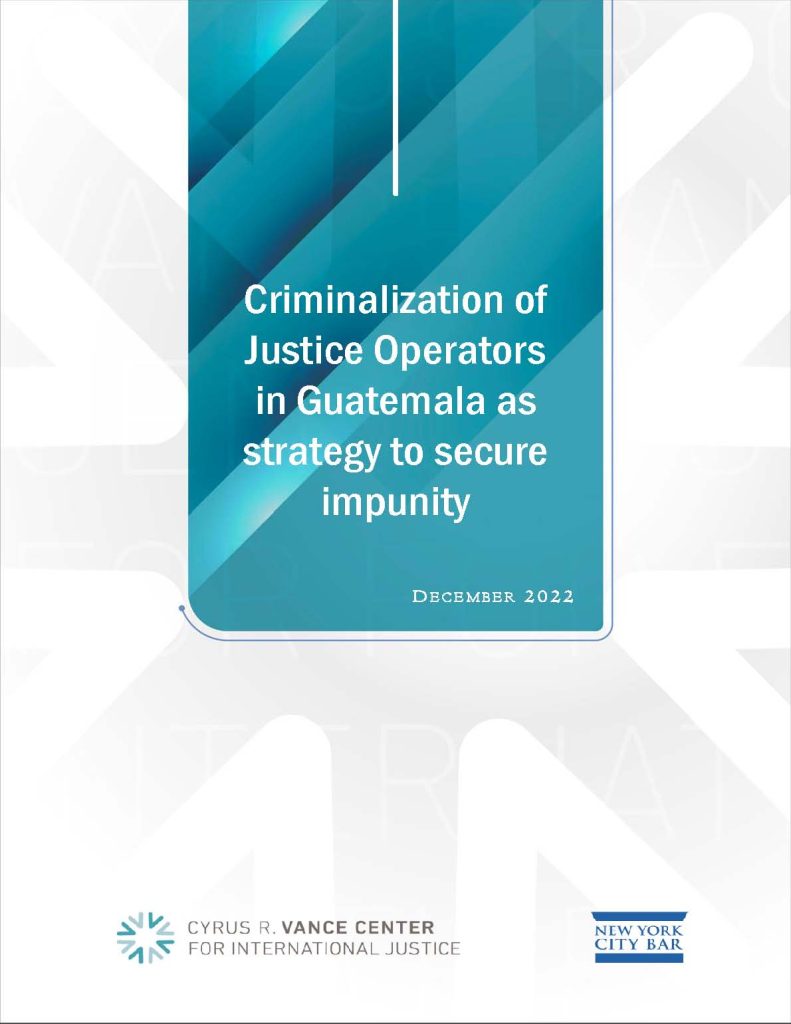Criminalization of Justice Operators in Guatemala as a strategy to secure impunity
December 2022
Report available here
The Cyrus R. Vance for International Justice of the New York City Bar Association (Vance Center) published the report “Criminalization of Justice Operators in Guatemala as a strategy to secure impunity.“ The report identifies a systematic pattern of criminalization of independent judges and prosecutors related to high-level corruption cases against government actors and other groups as a strategy to secure impunity in Guatemala.
The analysis shows an increase in attacks on judicial and prosecutorial independence, especially after the departure of the International Commission against Impunity in Guatemala (CICIG, for its initials in Spanish) in 2019. The attacks intensified when the investigations of the Special Prosecutor’s Office against Impunity (FECI, for its initials in Spanish) were hindered and when its Chief Prosecutor was removed. Since then, judges and prosecutors dealing with high-impact cases have been targeted through actions ranging from smear campaigns and harassment through social media to administrative and criminal complaints.
The report detects that the international standards to protect judicial independence during disciplinary proceedings have not been respected and ensured in Guatemala in violation of the United Nations Basic Principles on the Independence of the Judiciary and the standards established by the Inter-American Human Rights System.
The report identifies the following main patterns that violate the independence of the judiciary in Guatemala:
- In most cases, the current complainants against judges and prosecutors are individuals that had been investigated for corruption by them. Despite justice operators carried out these investigations in abidance to their legal functions and powers, they are being retaliated by the current complaints for carrying out those investigations.
- Organizations and individuals regularly and systematically initiate judicial or disciplinary proceedings in retaliation against judges and prosecutors. These organizations are engaged in acts of intimidation against justice operators who work in corruption and human rights cases, especially in cases involving military members.
- The temporality of these complaints is another alarming factor since they all coincide and intensify with the departure of CICIG and the takeover of the prosecutor’s office and the high courts.
- Despite the lack of substantial grounds, judges have been stripped of their judicial immunity in proceedings violating the minimum rules of due process. The Supreme Court has processed requests of specific organizations and individuals with suspicious effectiveness.
- The high number of complaints against each justice operator in the fight against corruption is highly suspicious. It demonstrates a strategy of using any option to eliminate the involvement of judges, prosecutors, and other justice operators in proceedings and investigations.
Implementing these patterns in recent years has led to the arrest, transfer, removal, and prominent exile of more than 25 people. The scheme has spread to social leaders, human rights defenders, and independent press.
As a result, many international organizations, such as the Inter-American Commission of Human Rights, civil society organizations, and governments, such as the United States and the European Union, have expressed concerns over the criminalization and persecution of judges, prosecutors, and former members of CICIG.
Key recommendations:
- The Public Prosecutor’s Office and the other Guatemala authorities must analyze and dismiss the allegations against judges, prosecutors, and other justice operators based on spurious or political reasons lacking real means of conviction.
- Any proceedings against justice operators must be conducted promptly and in due process, ensuring compliance with the principles of transparency, access to information, publicity, and the due defense of accused persons.
- The Guatemalan authorities must analyze and take appropriate measures against persons who publicly threaten justice operators recurrently and systematically, activating the judiciary to wage a judicial war against them.
- The Inter-American System of Human Rights and the System for the Protection of Human Rights of the United Nations must respond effectively to requests to protect criminalized persons.
This report is based on an analysis of documents, interviews, and questionnaires conducted with current and former justice operators in Guatemala gathered between 2021 and 2022. The Vance Center is also grateful for technical support for this report from the International Legal Assistance Consortium, of which the Vance Center is a member.



